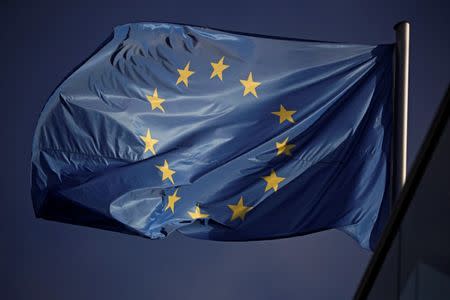Factbox - EU vote: the domestic fall-out across Europe
(Reuters) - European Parliament elections not only determine the make-up of the next EU assembly and help decide who ends up running top European institutions but can also play back into the national politics of the bloc's 28 member states.
Here is a run-down of some of those national stakes as Sunday night's voting closes and exit polls and early results start to come in:
FRANCE: Emmanuel Macron's allies put on a brave face as exit polls showed a narrow defeat at the hands of Marine Le Pen's far-right Rassemblement National party. But such a result would be a clear setback for the French leader, who had personally invested time in campaigning for the European vote. His Elysee Palace said it would "intensify" his reform effort.
GERMANY: Angela Merkel's ruling conservatives and their Social Democrat (SPD) coalition allies both suffered losses, bleeding support to the Greens in a further test for their loveless coalition. For the SPD, the poor result was exacerbated by a separate defeat in Sunday's Bremen state election, but party leader Andrea Nahles insisted she would remain in the federal coalition with the CDU.
AUSTRIA: Austrian Chancellor Sebastian Kurz will likely be strengthened in his fight to keep his job until early elections expected in September. A projection showed his conservative party coming a clear first in Sunday's EU vote despite a recent scandal involving his erstwhile far-right coalition partner.
GREECE: Greek Prime Minister Alexis Tsipras said he would call snap elections following the defeat of his Syriza party. Results showed Syriza trailing by up to nine points behind the opposition New Democracy party. Under normal circumstances, Tsipras's mandate ends in October.
POLAND: Poland's ruling Law and Justice party (PiS) came out narrowly ahead in a vote seen as test of the party's nationalist, eurosceptic platform before a national election later in the year. PiS had framed the European ballot as a battle against western liberal ideals that it says threaten the traditional way of life in Poland, a staunchly Catholic country.
ITALY: The far-right League emerged as Italy's largest party, overtaking its coalition partner the 5-Star Movement, exit polls said. If confirmed, such a result could alter the balance of power within the argument-plagued government, giving greater authority to League leader Matteo Salvini. Salvini is pushing for big tax cuts in possible defiance of EU budget rules.
BULGARIA - The ruling centre-right GERB party of Prime Minister Boyko Borissov won 30.5-32.7% of the vote, according to exit polls by two independent pollsters. The win gives Borissov’s coalition government some respite after a scandal over purchases of luxury properties at low prices.
CYPRUS: The Democratic Rally, the ruling conservative party came first in Cyprus with 29% of the vote, with opposition Communist Akel coming a close second with 27%. Based on projected results, Cyprus was to get its first Turkish Cypriot MEP, academic Niyazi Kizilyurek, making history on the ethnically-split island.
ROMANIA - Big losses loomed for the ruling Social Democrats (PSD), according to exit polls, which put them tying for first place with opposition centrists. A new grouping of parties, USR-Plus, secured third place with 24% of votes, opening up the prospect of a wider alliance pushing the PSD out of government next year.
PORTUGAL: Ruling centre-left Socialists looked to have won the elections with a higher tally than their 2014 result of 31.46%. That augurs well for them in the country's October general election, when they typically do better than at European ballots.
(Compiled by Mark John in London with bureaus; Editing by Frances Kerry)



